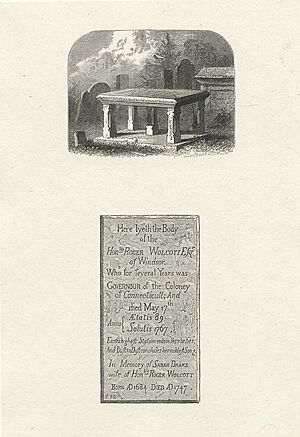Roger Wolcott (Connecticut politician) facts for kids
Quick facts for kids
Roger Wolcott
|
|
|---|---|
| Deputy Governor | |
| In office 1741–1750 |
|
| Preceded by | Jonathan Law |
| Succeeded by | Thomas Fitch |
| Personal details | |
| Born | January 4, 1679 Windsor, Connecticut |
| Died | May 17, 1767 (aged 88) Windsor, Connecticut |
| Spouse | Sarah Drake Wolcott |
| Children | Roger Wolcott Elizabeth Wolcott Newberry Alexander Wolcott Josiah Wolcott Erastus Wolcott Ursula Wolcott Griswold Oliver Wolcott Marian Wolcott Williams |
| Parents | Simon Wolcott Martha Pitkin Wolcott |
| Occupation | Weaver, Statesman, Politician |
| Signature | |
Roger Wolcott (born January 4, 1679 – died May 17, 1767) was an important leader from Windsor, Connecticut. He was a weaver, a statesman (a wise leader), and a politician. He served as the colonial governor of Connecticut from 1751 to 1754.
Contents
Early Life and Family
Roger Wolcott was born in Windsor, Connecticut. His parents were Simon Wolcott and Martha Pitkin Wolcott. Growing up in a small frontier village meant he didn't get much formal schooling.
At age twelve, Roger started learning to be a weaver. This meant he worked with a skilled weaver to learn the trade. By the time he was twenty-one, he started his own weaving business.
On December 3, 1702, Roger married Sarah Drake. They had fifteen children together before Sarah passed away in 1748. Two of their sons became very famous:
- Oliver Wolcott Sr. later signed the Declaration of Independence. He also became a governor of Connecticut.
- Erastus Wolcott became a state lawmaker and a judge on the highest court.
Roger Wolcott's Career
Roger Wolcott had many different jobs in his life. He was a very busy and important person in the Connecticut colony.
Becoming a Lawyer and Politician
In May 1709, Roger became a lawyer and started practicing law. In 1711, during a war called Queen Anne's War, he joined a military trip to Quebec. He helped manage supplies for the soldiers.
When he returned, he held many government positions:
- He was the Clerk of the House from 1710 to 1711.
- He was elected as a Deputy to the colony's Lower House several times (1709-1714, 1718, 1719). He even served as the Speaker (the leader) of the House in October 1719.
- In 1714, he was elected to the Upper House, also called the Council. He served as an Assistant there for many years (1714-1718, 1720-1741, 1754-1760).
Roger also helped settle land borders between different colonies. He was a Commissioner for this task many times between 1717 and 1750.
Military and Judicial Roles
Roger Wolcott was also involved in the military. In 1722, he became a Captain of the local militia group in Windsor. In 1724, he was a Captain of troops ready for active service. By 1739, he was made a Colonel, a high-ranking military leader.
He also served as a judge for many years:
- He was a judge for the Hartford County court from 1723 to 1732.
- He became a judge for the colony's Superior Court (a higher court) in 1732 and served until 1741.
Deputy Governor and Major General
In 1741, Roger Wolcott was elected as the Deputy Governor of the Connecticut colony. This meant he was the second-in-command to the governor. As Deputy Governor, he also became the chief judge of the Superior Court, a position he held until 1750.
In 1745, Roger Wolcott played a big role in a war called King George's War. He was a Major General, a very high military rank. He led Connecticut's troops in a major expedition to capture Fortress Louisbourg from the French. This was a very important victory!
Becoming Governor
When Governor Jonathan Law passed away in 1750, Roger Wolcott became the new governor. He was re-elected every year until 1753.
During his time as governor, a Spanish ship carrying a lot of valuable cargo got stuck near New London. Governor Wolcott ordered the ship and its cargo to be taken for safekeeping. This was to help figure out who owned the cargo. However, a large part of the cargo mysteriously disappeared while it was being held.
This event caused a scandal, and Roger Wolcott lost the next election in 1754. He was the first governor not to die in office. After this, he mostly stopped working in public life. He spent his time studying and writing. In 1759, he wrote a short history of the Connecticut colony.
Later Years and Passing
Roger Wolcott passed away at his home in Windsor at the age of 88. He is buried at the Old Burying Ground (Palisado Cemetery) in Windsor.
 | Sharif Bey |
 | Hale Woodruff |
 | Richmond Barthé |
 | Purvis Young |


